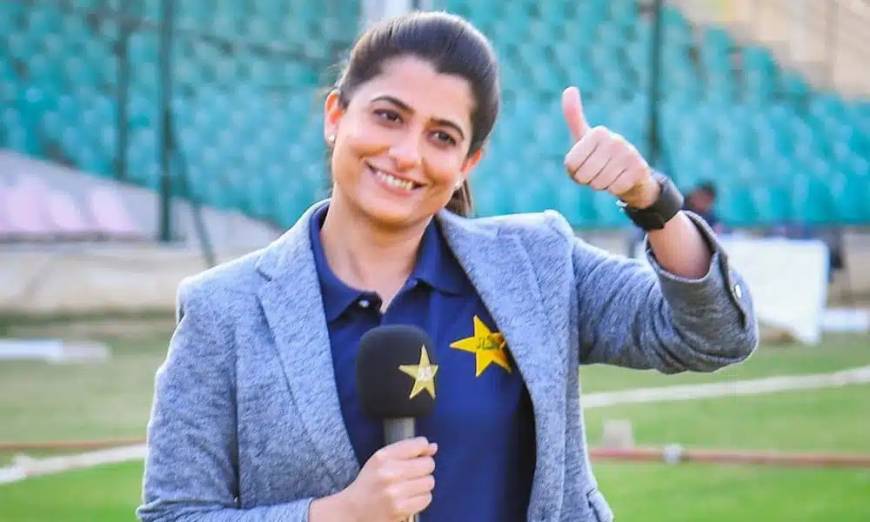Sana Mir Responds Strongly to Critics After Commentary Backlash
Former Pakistan women’s cricket captain Sana Mir responds to backlash over her commentary at the Women’s ODI World Cup. She clarifies her remarks about Natalia Pervaiz’s hometown, calling the controversy “unnecessary” and urging fans to keep politics out of cricket.

Sana Mir Responds to Backlash
Former Pakistan women’s cricket captain and celebrated commentator Sana Mir has strongly responded to a wave of criticism and propaganda directed at her following her commentary during the ongoing Women’s ODI World Cup 2025.
In a statement issued after trending across social media platforms, Sana Mir described the backlash as “unfortunate, unnecessary, and disappointing.”
“It is sad to see matters being exaggerated in such a way. Sportspeople and commentators are already under immense pressure, and it is truly unfortunate that I am forced to issue a public clarification on this,” she said.
The Origin of the Controversy
The controversy erupted when Sana Mir, while on commentary duty, referred to Pakistani cricketer Natalia Pervaiz’s hometown as Azad Kashmir. What was intended as a casual reference to a player’s background soon became the subject of heated debate across the border.
Certain segments of the Indian media accused Mir of politicizing cricket and urged the International Cricket Council (ICC) to take action against her. Social media campaigns began trending, with calls for her removal from the commentary panel.
In the days following the commentary, cricket portal CricInfo updated Natalia Pervaiz’s profile. Previously listed as Bandala, Azad Jammu and Kashmir, it was changed to Pakistan-administered Kashmir, sparking further debate online.
Sana Mir’s Clarification
Sana Mir, who was inducted into the ICC Hall of Fame in 2020, quickly clarified her remarks. She explained that her intention was not political but rather to highlight the inspiring journey of Natalia Pervaiz and other players.
“As commentators, it is part of our role to tell stories about where players come from, their struggles, and their determination to make it to the international stage,” she said.
“I mentioned players from two other regions as well, but only this particular reference has been politicized. It is disappointing to see sports used as a tool for division rather than unity.”
A Career of Breaking Barriers
Sana Mir, 39, remains one of Pakistan’s most celebrated cricketers. During her international career, she captained Pakistan to landmark victories, including back-to-back Asian Games gold medals in 2010 and 2014.
With more than 100 wickets in ODIs and a reputation as a reliable all-rounder, she inspired a generation of young women to take up cricket in Pakistan. After her retirement in 2020, she transitioned into broadcasting, where her insightful analysis and calm demeanor have earned her respect globally.
Her rise as a commentator also made her a role model for women in sports media, a field traditionally dominated by men.
Sport vs. Politics
The incident has reignited discussions on the role of politics in sports. Over the years, cricket between Pakistan and India has often been overshadowed by political narratives. Sana Mir urged fans and media outlets to focus on the essence of the sport instead of amplifying divisions.
“Cricket should remain a source of joy, inspiration, and unity. It is disheartening to see divisive narratives being forced upon it. We owe it to players and fans to keep the spirit of sportsmanship alive,” she said.
Global Reactions
The backlash against Mir has drawn mixed responses worldwide.
-
Supporters in Pakistan praised her for standing firm and refusing to bow to propaganda. Hashtags such as #StandWithSanaMir trended on social media, with many fans recalling her services for Pakistan cricket.
-
Critics across the border argued that cricket should remain neutral and accused her of blurring political lines.
-
Neutral observers highlighted that commentators often mention players’ hometowns and cultural backgrounds to give context, making the campaign against Mir seem exaggerated.
Former cricketers and analysts also weighed in. Many said that if hometown references are viewed through political lenses, it would place unnecessary restrictions on commentary.
ICC’s Position
As of now, the International Cricket Council (ICC) has not issued an official statement on the controversy. Insiders suggest that the governing body is unlikely to take disciplinary action since Mir’s remarks were factual and not political in intent.
A senior cricket official, speaking off the record, noted: “Commentators are encouraged to tell the stories of players, their upbringing, and challenges. Unless a remark is deliberately inflammatory, it cannot be deemed a violation.”
A Broader Debate
This incident has raised a broader question: Can sports ever remain fully separate from politics?
For decades, cricket between India and Pakistan has carried symbolic weight beyond the boundary lines. Players, commentators, and fans often find themselves navigating sensitive issues.
However, many argue that targeting individuals for simple factual references sets a dangerous precedent and risks silencing voices in sports broadcasting.
Sana Mir’s Message to Fans
Closing her statement, Sana Mir reiterated her belief in the unifying power of sports:
“Sports are meant to bridge divides and celebrate human achievement. My only focus is to highlight the journeys of cricketers who work tirelessly to represent their countries. I sincerely hope we can all work together to keep cricket free of unnecessary controversies.”
Her dignified response has been widely praised, with many calling it an example of how athletes and commentators should handle criticism in an era of instant social media outrage.
The controversy surrounding Sana Mir reflects the fragile balance between sports, identity, and politics in South Asia. While her remarks about Natalia Pervaiz’s hometown were intended as a celebration of her background, they instead became a flashpoint for cross-border debate.

 Ateeq Ur Rehman
Ateeq Ur Rehman